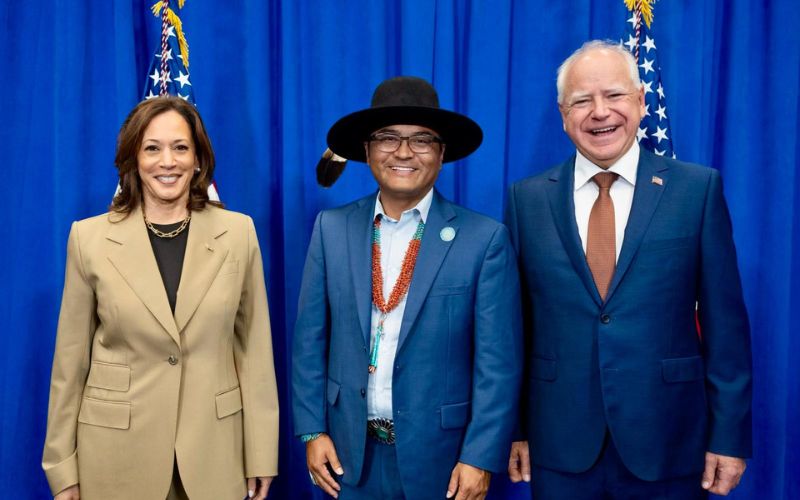
- Details
- By Native News Online Staff
Native Vote 2024. Navajo Nation President Buu Nygren has officially endorsed Vice President Kamala Harris and Minnesota Governor Tim Walz as his choice for President and Vice President of the United States.
In his endorsement, Nygren pointed to Vice President Harris’ work with President Joe Biden to promote tribal communities through the American Rescue Plan Act (ARPA) infrastructure support, water development, health care, and public safety. The ARPA delivered $2 billion in crucial funding for infrastructure, housing, clean water, and internet connectivity across the Navajo Nation.
“Under Kamala Harris and Tim Walz, every Native American person will matter equally,” Nygren said. “Together as one nation, President Kamala Harris and Vice President Walz will be thinking for the future of the Navajo Nation.”
Nygren also praised the Biden-Harris administration’s commitment to public safety initiatives, noting the establishment of the Not Invisible Act Commission aimed at addressing the crisis of Missing and Murdered Indigenous People. He highlighted the expansion of tribal jurisdiction through the Violence Against Women Act and the empowerment of tribal decision-making via Executive Order 14112, which reformed federal funding policies.
In healthcare, Nygren pointed out that the administration secured the first-ever advance appropriations for the Indian Health Service, ensuring a planned $8 billion in funding for FY2025, which promises stability in healthcare for Native communities.
Turning to Governor Walz, President Nygren cited his proven dedication to Native American issues in Minnesota. Walz has visited all 11 tribal nations in the state, established government-to-government relations, and codified tribal consultation into law. Under his leadership, Minnesota has prioritized public safety, including the creation of the first state-level office for Missing and Murdered Indigenous Relatives. His administration also invested in preserving Native languages and enhancing cultural education, showcasing his commitment to supporting Indigenous heritage.
“Governor Walz has shown that he listens and respects our voices,” Nygren said. “He has proven to be an ally who prioritizes public safety and cultural preservation, and I am confident he will bring this commitment to the national stage.”
First Lady Jasmine Blackwater-Nygren, an attorney and former Arizona State Representative, also joined President Nygren in endorsing the Harris-Walz ticket, expressing her shared belief in their ability to uplift and protect Native communities.
With tomorrow's President election, Nygren urged the Navajo Nation to mobilize and make their voices heard at the polls. “Together, with Kamala Harris and Tim Walz, I believe they will help us reclaim our traditions, protect our sovereignty, and honor the sacrifices of our ancestors,” he said.
“Navajo Nation, let us get out the vote and get them elected. Under Kamala Harris and Tim Walz, every Native American person will matter equally."
More Stories Like This
Native News Weekly (August 25, 2024): D.C. BriefsUS Presidents in Their Own Words Concerning American Indians
Indigenous Actor Elaine Miles Reports Detention by Alleged ICE Agents
Happy Thanksgiving from Native News Online
Coming Up on Native Bidaské: Behind the Animation: Joey Clift Talks “Pow” and Native Storytelling
Help us tell the stories that could save Native languages and food traditions
At a critical moment for Indian Country, Native News Online is embarking on our most ambitious reporting project yet: "Cultivating Culture," a three-year investigation into two forces shaping Native community survival—food sovereignty and language revitalization.
The devastating impact of COVID-19 accelerated the loss of Native elders and with them, irreplaceable cultural knowledge. Yet across tribal communities, innovative leaders are fighting back, reclaiming traditional food systems and breathing new life into Native languages. These aren't just cultural preservation efforts—they're powerful pathways to community health, healing, and resilience.
Our dedicated reporting team will spend three years documenting these stories through on-the-ground reporting in 18 tribal communities, producing over 200 in-depth stories, 18 podcast episodes, and multimedia content that amplifies Indigenous voices. We'll show policymakers, funders, and allies how cultural restoration directly impacts physical and mental wellness while celebrating successful models of sovereignty and self-determination.
This isn't corporate media parachuting into Indian Country for a quick story. This is sustained, relationship-based journalism by Native reporters who understand these communities. It's "Warrior Journalism"—fearless reporting that serves the 5.5 million readers who depend on us for news that mainstream media often ignores.
We need your help right now. While we've secured partial funding, we're still $450,000 short of our three-year budget. Our immediate goal is $25,000 this month to keep this critical work moving forward—funding reporter salaries, travel to remote communities, photography, and the deep reporting these stories deserve.
Every dollar directly supports Indigenous journalists telling Indigenous stories. Whether it's $5 or $50, your contribution ensures these vital narratives of resilience, innovation, and hope don't disappear into silence.
 The stakes couldn't be higher. Native languages are being lost at an alarming rate. Food insecurity plagues many tribal communities. But solutions are emerging, and these stories need to be told.
The stakes couldn't be higher. Native languages are being lost at an alarming rate. Food insecurity plagues many tribal communities. But solutions are emerging, and these stories need to be told.
Support independent Native journalism. Fund the stories that matter.
Levi Rickert (Potawatomi), Editor & Publisher

